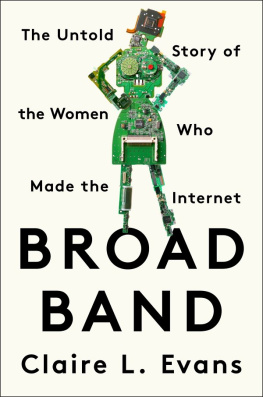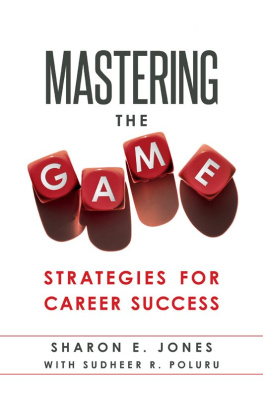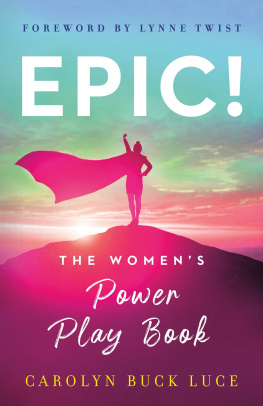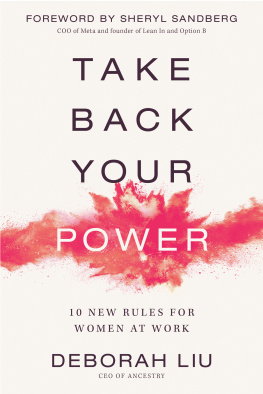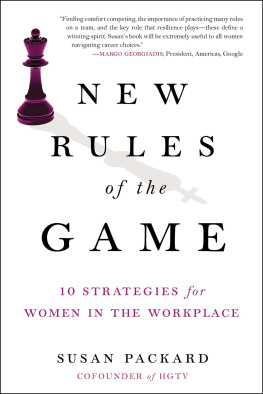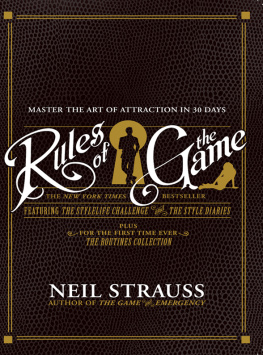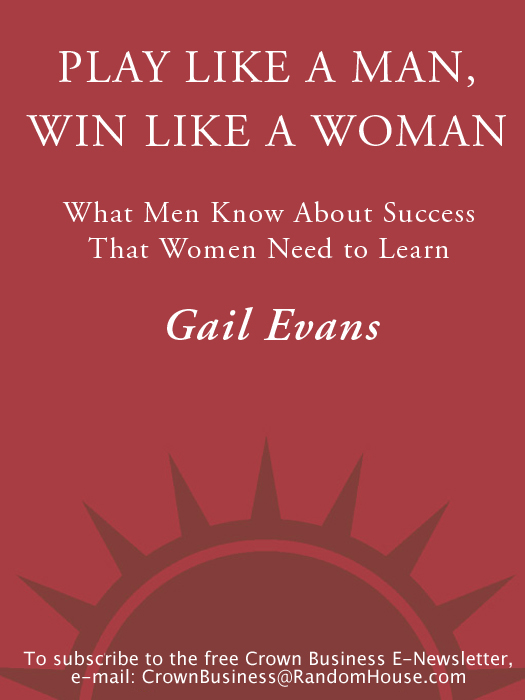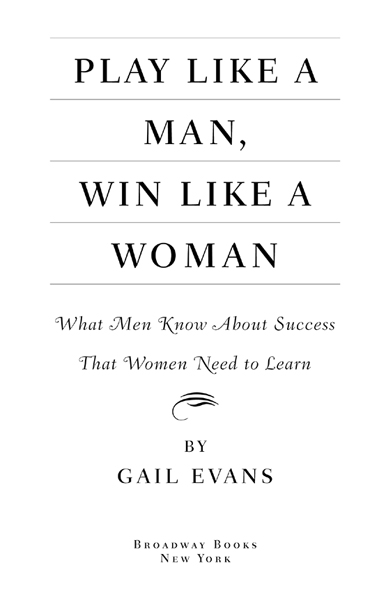
A hardcover edition of this book was published in 2000 by Broadway Books.
PLAY LIKE A MAN, WIN LIKE A WOMAN . Copyright 2000
by Gail Evans.
All rights reserved.
No part of this book may be reproduced or transmitted in any form or by
any means, electronic or mechanical, including photocopying,
recording, or by any information storage and retrieval system, without
written permission from the publisher. For information, address Broadway
Books, a division of Random House, Inc.,
1540 Broadway, New York, NY 10036.
BROADWAY BOOKS and its logo, a letter B bisected on the
diagonal, are trademarks of Broadway Books,
a division of Random House, Inc.
Visit our website at www.broadwaybooks.com
The Library of Congress has cataloged the hardcover edition as:
Evans, Gail, 1941
Play like a man, win like a woman : what men know about
uccess that women need to learn . by Gail Evans.1st ed.
p. cm.
1. BusinesswomenPyschology. I. Title.
HD6053 .E85 2000
650.1082dc21
99-462238
eISBN: 978-0-7679-0747-7
v3.1
For Julianna, Jason, and Jeffrey
CONTENTS
PREFACE
W HEN IT COMES TO ROLE MODELS , I WAS LUCKY . I grew up believing a woman could do anythinga conviction inherited from my mother. On the surface, my mother seemed like a conventional woman, a suburban housewife who tended to her home and husbands career. But all the while she was sending me the message that a woman is responsible for her own life, and that she should live it to the fullest.
My mother certainly did. Even while taking excellent care of her own family, she helped care for an adopted younger brother and sister from a local institution for juvenile delinquents, she taught at the Jewish Guild for the Blind, and as a volunteer Red Cross ambulance driver, she drove physically and mentally disabled veterans to picnics and ball games.
The manager of a chain of millinery stores in the 1920s, my mother gave up her career for marriage. But she never surrendered her drive or her belief in herself. Throughout my life, she gave me two sets of instructions: I must be a good and proper woman and I could be anyone I wished.
I took that advice to heart. After leaving college in 1963, I began a successful career in politics, working on Capitol Hill and at the White House. But when I married, like my mother and most women of the time, I abandoned my career for my husbands. We moved to Atlanta and then to the Soviet Union. After returning to Georgia, where I raised my three children, I began doing freelance research and public relations for international corporations. In 1980, I joined CNN, which was beginning operations.
Eventually I got the opportunity to create the first central booking department for a network (booking means finding the experts who appear on television). When CNN International was created, my responsibilities were extended to that network as well. In 1987, I was made a vice president; two years later I created CNN&Co, the first television talk show to feature women discussing the major issues of the day rather than simply womens issues. After a promotion to senior vice president, I co-developed TalkBackLive, the first interactive television news program, and in 1996 I was instrumental in creating Burden of Proof, the first daily legal talk show on network television.
Along the way, like my mother, I have tried to give my time to others. In 1997, the same year I was made executive vice president of CNN, President Clinton appointed me to the Commission on White House Fellows. Im a member of the Committee of 200, the International Womens Forum, the Citizens Review Panel of the Juvenile Court of Atlanta, and have taught a seminar on gender issues in business at Atlantas Emory University Business School. And I serve on the board of several universities and not-for-profit organizations.
I also have a daughter and two daughters-in-law, as well as a granddaughter, all of whom I hope will feel as optimistic about being a woman as my mother and I have felt.
If they do, they are lucky. Over the last two decades I have met thousands of women who have told me they feel lost in a workplace where the men generally rule and the women generally follow. I have always tried to give these women my best advice, and Ive always hoped that somewhere I would encounter a group that didnt need what I had to say.
Then I was invited to address the female students and alumnae at Harvard Business School. I thought here, if anywhere, is the place where women have conquered the workplace.
I was wrong. The Harvard women had learned their academic lessons well and risen to high positions, but they felt isolated. They still complained that they often felt lost in the male-oriented workplace, and werent sure how to cope.
So I decided to write down the gist of all the talks my mother had given me, and all I have passed along to my own daughter and daughters-in-law, as well as all the hundreds of speeches I have made to groups of women around the country. Although television is the great medium of the day, I feel the best way to pass along history is through the printed word. Personally, I believe that Im only as good as what I have taken away from the last book Ive read.
What I want you to take away from this book is the ability to work in an office atmosphere where you dont say, I didnt get what I deserved today because, as a woman, I didnt know how to play the game.
My greatest desire is that someday we will eliminate the conversation about inequality between women and men at work, so that when we come to the workplace as peers, how we do our jobs will be all that matters.
INTRODUCTION
N OT LONG AGO , I SPOKE AT A SMALL CONFERENCE of successful businesswomen. Afterwards came the deluge, as one woman after another came up to me and asked for advice.
It always happens at these events. I speak, I listen, I hear the same words over and overbaffled, angry, lost, trapped, stuck, overwhelmed as each woman tells me she feels that shes gotten only so far in business and cant get any further.
One of the women at the conference told me shes a vice president at the Fortune 500 company where shes been working for two decades. In the last four years she has been given two new lofty-sounding titles, but no more power. She thinks she has hit a wall.
Have you made it clear what you want? I asked. Have you taken any action?
No, she said.
Like so many women, she doesnt understand that when you have an ongoing serious complaint, you dont simply, meekly, live with it. You try to change it.
I told her that she needed to take action.
What kind of action? she asked.
Anything, I said. One action will lead to another. Talk to the CEO. Job hunt. Anything. Just do something!
She sighed. I dont understand. They know what a good job I am doing. Why dont they just reward me for it?
With that attitude, she is losing the game.
If you dont read the directions manual when you start a game, you wont know how to proceed. You open the box, and in front of you are the board, markers, and dice, but you dont have a clue. If youre playing by yourself, you can improvise, but you may get it wrong. If youre playing with others, you can always follow their lead. But while theyre focused on winning, you have to keep asking yourself if youre getting it right.




